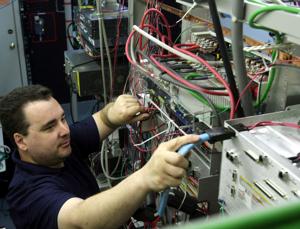Maine still has much work to do to improve broadband availability, report says

(The Center Square) – Maine received a “C” rating from R Street’s 2020 Broadband Scorecard Report; the same grade it’s held since 2018.
The score card rates individual states’ laws pertaining to broadband utilization which includes franchising, right-of-way access, permits and more.
The report said the low score is a direct result of the lack of cost controls on right-of-way access and construction permitting.
While there are limitations on franchise fees, there is no uniform statewide franchising.
“This, paired with application fee caps and shot clocks, would drastically help with deployment throughout the state,” the report said.
The state struggles to provide statewide broadband services for the simple fact there isn’t enough money to cover the incredible rural geography and population spread over such a broad area, said Maggie Drummond-Bahl, senior program officer for the Maine Community Foundation.
“This means that we need to find other models of expanding infrastructure and both state and federal dollars are critical in doing that.”
Drummond-Bahl said data the state relies on is inaccurate when it comes to what areas are served. These apparent inaccuracies complicate efforts for states to obtain funding as some areas appear to have service on a map, but in reality do not.
“Lastly, the federal funding programs can be difficult for communities to access and they often need support and consultants to do so, and even when they are successful unexpected costs and difficulties arise later,” she said.
The foundation is ramping up efforts to access various funding sources and to collect data about service speeds and reliability all over the state while working with partners focusing on the broadband issue.
“There is no doubt that COVID-19 has been the accelerant for this issue, shining a light on how important being connected is for accessing education, combating social isolation, accessing health care and critical services and so much more,” she said.
The primary focus of the foundation is supporting organizations and experts involved in advocacy and policy issues in the state. They have been able to ease the way for communities to do pole attachments, to form municipal broadband utilities and help communities access state and federal funds, creating a statewide bond for broadband in 2020 and conducting statewide speed test mapping campaign to secure accurate data about service statewide.
Its 2017 broadband initiative includes several strategies, one of them being the Community Broadband Grant Program, designed to fund a wide range of community and regional needs for public education and research, consultants, mapping, surveys, Wi-Fi hot spots and more. It also extends support to funding startup initiatives relating to planning and infrastructure, equipment upgrades for some facilities such as homeless shelters or libraries.
To date the fund has awarded between $100,000-$130,000 per year over the last three years to support digital literacy programs and technical assistance grants in communities seeking to expand broadband access in their locales.
Disclaimer: This content is distributed by The Center Square

